|
|
|
Sort Order |
|
|
|
Items / Page
|
|
|
|
|
|
|
| Srl | Item |
| 1 |
ID:
141674
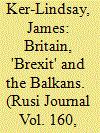

|
|
|
|
|
| Summary/Abstract |
A British decision to leave the European Union (in what has become known as a potential ‘Brexit’) could have a significant effect on the UK's relationship with the Western Balkans, argues James Ker-Lindsay. It would almost certainly reduce the country's influence over Bosnia and Herzegovina and its ability to shape the process of engagement between Serbia and Kosovo. At the same time, the UK would gain no material advantage in terms of its ability to handle other regional issues that may have a direct or indirect effect on Britain, such as illegal migration and the flow of fighters from the Balkans into Syria.
|
|
|
|
|
|
|
|
|
|
|
|
|
|
|
|
| 2 |
ID:
141673


|
|
|
|
|
| Summary/Abstract |
Any discussion of a potential ‘Brexit’ should be set against the backdrop of an increasingly convulsive European landscape. The merits and shortcomings of the European Union should be judged not in isolation, but through the lens of their implications upon a broader postwar European order that Britain has helped to build and sustain for nearly seven decades. US strategic retrenchment, Germany's economic and political pre-eminence within the EU, and Russia's attempts to recreate a sphere of influence in Eastern Europe are likely to disrupt the European balance. Luis Simón argues that ‘Brexit’ could exacerbate each of these disruptive trends – with negative ramifications for UK national security. Conversely, he contends, by leveraging its membership of and influence within the EU, Britain could help revitalise the transatlantic relationship, mitigate the spectre of a German-dominated EU, and check Russian revisionism in Eastern Europe.
|
|
|
|
|
|
|
|
|
|
|
|
|
|
|
|
| 3 |
ID:
141680
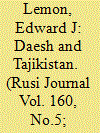

|
|
|
|
|
| Summary/Abstract |
The threat of radical Islam has been used by the Tajik government as a way to promote discriminatory policies based on a misinterpretation of the causes and extent of radicalisation in the country, argues Edward J Lemon. He analyses the Tajik government's rhetoric and policies to show how it has created a situation of insecurity for the country's citizens.
|
|
|
|
|
|
|
|
|
|
|
|
|
|
|
|
| 4 |
ID:
141671
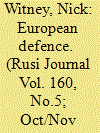

|
|
|
|
|
| Summary/Abstract |
Many have written off the EU's Common Security and Defence Policy as a lost cause. Nick Witney, on the contrary, argues that the UK should fully engage with European efforts and lead its EU partners in finding an effective policy to meet their collective defence and security needs.
|
|
|
|
|
|
|
|
|
|
|
|
|
|
|
|
| 5 |
ID:
141678
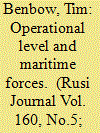

|
|
|
|
|
| Summary/Abstract |
The ‘operational level’ of war tends to be considered primarily from the land perspective, with relatively little thought given to its relevance to the maritime environment. In this article, Tim Benbow assesses the concept of the operational level, suggesting that although sometimes misused, it does have utility. He argues that the operational level and operational art both apply to the maritime environment. He then explores the ways in which the operational level differs in this environment, highlighting in particular the role of time and distance, and the relationship between attack and defence.
|
|
|
|
|
|
|
|
|
|
|
|
|
|
|
|
| 6 |
ID:
141676
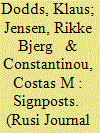

|
|
|
|
|
| Summary/Abstract |
The UK Sovereign Base Areas (SBAs) in Cyprus are products of the terms and conditions attached to Cypriot independence in 1960, and are highly unusual territorial and political entities. Since the 1974 division of the island, the SBAs have co-existed with the Republic of Cyprus, the unilaterally declared Turkish Republic of Northern Cyprus and a UN-administered Buffer Zone. Recent reunification talks between the Greek Cypriots and Turkish Cypriots hold out the promise of change, however. Klaus Dodds, Rikke Bjerg Jensen and Costas M Constantinou explore ‘signposts’ of the changing landscape – both figuratively and literally – that help make sense of the current situation and also illuminate three possible future scenarios facing Cyprus, the UK and its SBAs.
|
|
|
|
|
|
|
|
|
|
|
|
|
|
|
|
| 7 |
ID:
141670
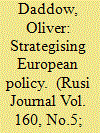

|
|
|
|
|
| Summary/Abstract |
As David Cameron moves towards a renegotiation of the UK's terms of membership of the EU and an in/out referendum, he will confront a series of strategic challenges. Oliver Daddow argues that the prime minister will first have to develop a convincing pro-membership narrative against the backdrop of an EU in crisis and a widespread antimembership movement in the UK, given voice by a generally EU-hostile media.
|
|
|
|
|
|
|
|
|
|
|
|
|
|
|
|
| 8 |
ID:
141675
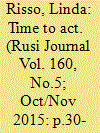

|
|
|
|
|
| Summary/Abstract |
Since 1989, NATO has expanded its strategic concept and geopolitical scope to the detriment of an efficient and well-defined military capability in Europe. However, the Ukrainian crisis has brought the attention back to Europe and to NATO's deterrent value. Linda Risso argues that, as one of the Alliance's leading members, the UK must act as a catalyst to ensure that NATO has the necessary military strength and political will to respond to the new security challenges.
|
|
|
|
|
|
|
|
|
|
|
|
|
|
|
|
| 9 |
ID:
141679


|
|
|
|
|
| Summary/Abstract |
A decision to replace Trident with a like-for-like system will see the UK remain in the nuclear-weapons business well into the second half of this century, but it is far from clear that reliance on a small, retaliatory nuclear capability for deterrence would be the best approach to an increasingly complex future nuclear-threat landscape. Andrew Futter argues that the requirements of deterrence are perhaps more blurred today than at any point in the nuclear age – a situation only likely to get worse. A more holistic and long-term view of UK nuclear policy is needed, with greater consideration given to how techno-military, strategic and, to a lesser extent, political-normative developments are likely to alter, if not transform, the nature of the future deterrence environment.
|
|
|
|
|
|
|
|
|
|
|
|
|
|
|
|
| 10 |
ID:
141677


|
|
|
|
|
| Summary/Abstract |
Critical National Infrastructure in the UK and US faces a series of cyber-threats and vulnerabilities. Noel K Hannan examines the US resources available to combat the problem, in particular the concept of cyber-reserves, and looks at the detail of the Cyberguard series of exercises. He then assesses UK doctrine, methodology and involvement in these exercises as well as the problems facing the use of cyber-reserves under the current operating model. The conclusion provides some thoughts on future deployment scenarios.
|
|
|
|
|
|
|
|
|
|
|
|
|
|
|
|
|
|
|
|
|